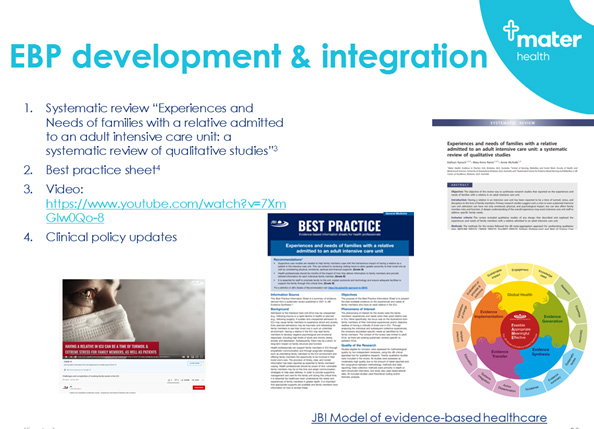From Evidence to Impact: Embedding a culture of best practice in an acute care health facility

Acute care health centres are under increasing pressure to provide safe, low variability, cost-effective patient-centred care. Evidence-based healthcare is crucial if we are to align to this vision; however, establishing and embedding a culture of best practice within an organisation presents organisational, individual and social challenges (Slade et al., 2018; Yost et al., 2015). Building research culture and capacity requires resources, contextual relevance, strong collaborations, individual self-efficacy as well as strong leadership support. To be successful, novel and innovative approaches are needed to reduce the research-practice gap.
The Queensland Centre for Evidence-Based Nursing and Midwifery: A JBI Centre of Excellence (QCEBNM), has been established within an acute health care setting for over 20 years. As one of the inaugural JBI Collaboration entities, staff within the centre strive to provide accurate and current evidence to health professionals to inform their clinical decision-making. Healthcare is a dynamic and often reactive service that requires a flexible and priority-driven approach to meeting organisational needs. Strong leadership is needed to support and sustain changes.
Our organisation moved to a state-wide model in 2020, presenting challenges and opportunities for service delivery. With over 11 private and public health facilities providing care across the state of Queensland, our staff require access to current research and information to support care for patients in both regional and metropolitan areas.
‘Embedding JBI EBP resources within our services is one way of being able to provide staff with up-to-date evidence-based information,’ says Centre Director, Kate Kynoch. ‘Conducting reviews relevant to health service issues is a priority of our centre. One example is a qualitative synthesis conducted in 2021 on the experiences and needs of families with a relative admitted to an adult intensive care unit. From 20 included studies, four synthesised findings were reported on, relating to psychosocial health, proximity, information needs, and the intensive care unit environment. Findings from the review were then collated into a Best Practice Information Sheet by JBI, highlighting three actions that clinical staff could take, based on the research evidence, to support families who have a loved one in ICU. Following the publication of the best practice sheet, a video was developed which presented the main findings of the review in an engaging format.’3,4
The review process and development of the subsequent resources were integral in demonstrating to staff how research evidence can be integrated into practice. Staff were shown the review, the JBI Best Practice Information Sheet on the JBI EBP Database, and the video in short EBP education sessions during 2022-2023. Staff found the video useful, as it presented a summary of the key review findings in a way that resonated with them. Being able to visually demonstrate how research findings can be implemented is a powerful strategy for supporting best practice behaviours. We were also able to use these resources to demonstrate how evidence can be used to develop evidence-based clinical policy documents, with recommendations from the best practice sheet and qualitative review being integrated into our local family-centred care policy.
The QCEBNM aims to support staff in our health service with the necessary tools and resources to deliver the best care to their patients. The impact of embedding an EBP culture, including JBI resources, is evident in our organisation through the integration of evidence into our local policies and procedures. It is also reflected in the feedback we receive from staff on our education programs and from patients about the quality care they receive while in our facilities. Our relationship with JBI is integral to our commitment to this goal. We look forward to developing more evidence for practice relative to health priorities and will continue to promote the work of JBI to our staff within our EBP education programs and workshops.

References
1. Slade S. C., Philip, K., & Morris, M. E. (2018). Frameworks for embedding a research culture in allied health practice: a rapid review. Health Research Policy and Systems, 16(1), 29.
2. Yost, J., Ganann, R., Thompson, D., Aloweni, F., Newman, K., Hazzan, A., ... & Ciliska, D. (2015). The effectiveness of knowledge translation interventions for promoting evidence-informed decision-making among nurses in tertiary care: a systematic review and meta-analysis. Implementation Science, 10(1), 98.
3. Kynoch, K., Ramis, M-A., McArdle, A. (2021). Experiences and needs of families with a relative admitted to an adult intensive care unit: a systematic review of qualitative studies. JBI Evidence Synthesis 19(7), 1499-1554.
4. Stephenson, M. [Best Practice Information Sheets]. Experiences and needs of families with a relative admitted to an adult intensive care unit. JBI EBP Database. 2021; 23(7):1-4.